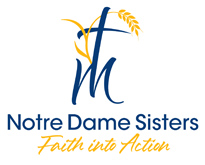What is happening on the US/Mexico border and what should I do?
 By Sr. Mary Kay Meagher, ND Social Justice Coordinator
By Sr. Mary Kay Meagher, ND Social Justice Coordinator
The Border. The Border. The Border.
Anyone who watches the news has seen the influx of our brothers and sisters from Central and South America, and the images are horrifying. Every day, it seems, we are hit full-force with a cacophony of grotesque pictures: the three-year-old child dropped over the border wall alone; a woman’s body found on the shores of the Rio Grande River; an eight-year-old in tearful anguish, separated from his family, and picked up by US Border Control; thousands of children separated from family packed together on Mylar sheets on a shelter floor; parents screaming in torturous wailing as they are separated from their children, stories of rape, gang activity and child trafficking.
Why is this happening?
Images speak a thousand words and raise even more questions. Where are these people coming from when they cross the southern border into the United States? The majority are from Mexico and Central America countries like Honduras and Guatemala. Why? Many flee corruption in their own governments or unpunished gang activity and uninvestigated death threats. They face relocation to poor agricultural land, destroyed by corporations that changed the landscape for their own use. Some have experienced hurricanes more devastating than Hurricane Katrina, others have experienced killer tornadoes worse than those that tore through Iowa last year. These people are refugees who are hungry, unable to grow on their own land, have poor health care systems, little opportunity for education, and no government to turn to for help.
We are all living on The Border
This is not (nor cannot) be taken lightly by those of us born in the US because we are all on the Border. The border is more than the above events. It is not one place. The 1,933 miles separating Mexico and US is one of many different places, towns, cities, landscapes, people, and weather. It is more than “down there”.
This border reaches further into our very own cities and states where we meet those who have left horrendous situations. You haven’t met “them?” Yes, you have! These people are working as meatpackers, nighttime office cleaners, roofers, fruit pickers, right in your hometown. Most are underpaid. Most are overworked.
Many more of these brothers and sisters of ours are sitting in detention jail waiting without legal representation, those who have a paying job likely to be at the bottom of the salary scale with little opportunity for advancement. The Border is a complex, decades-old situation with extremely convoluted legislation and policies not caused by one person or one administration but is carried by each of us in our nation.
What can we do?
The bigger and more complex question is Why are they coming? Of the myriad questions, this one is awkward, intricate, perplexing, uncomfortable, convoluted, and raising feelings of guilt, anger, helplessness and the inability to know how to respond.
The Border demands of each of us much more intentional, personal and active involvement such as:
- Becoming a better learner about the entire situation
- Asking the honest but difficult questions
- Using your voting voice with legislators to bit by bit demand transformation of our broken immigration system
- Addressing root causes
- Responding when able with monetary donations to organizations providing immediate care
- Volunteering in person when able
“Why are they coming?” The answer is caught in the powerful poem “Home” by a Kenyan-born Somali poet Warsan Shire. The first line is:
no one leaves home unless
home is the mouth of a shark
I urge you to listen to or read the entire poem here.
